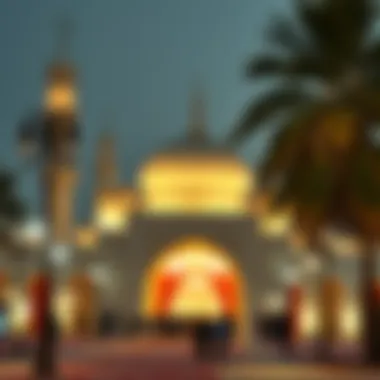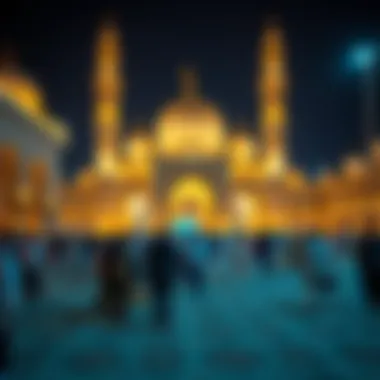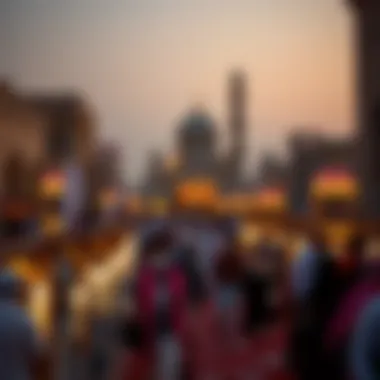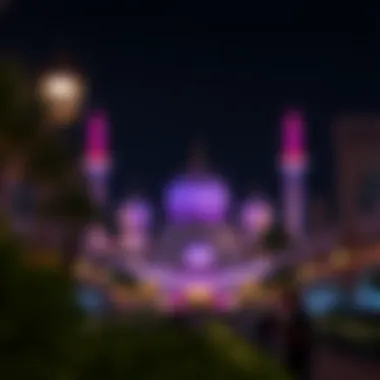Eid Celebrations in Dubai: Traditions and Impact


Intro
Eid celebrations in Dubai stand as a vibrant tapestry woven with rich cultural traditions, contemporary practices, and community spirit. These festive days, marking the end of Ramadan and the beginning of Eid al-Fitr, are not only significant for their spiritual meaning but also for their vast socio-economic implications. As the city transforms into a spectacular showcase of lights, colors, and unifying joy, both residents and visitors partake in unique events, rituals, and special offers specifically designed to amplify the festive atmosphere.
The essence of Eid here pulsates through bustling markets, glittering displays, and lively gatherings, creating a mosaic of experiences catering to diverse audiences—families, friends, and foreigners alike. In understanding these celebrations, one cannot overlook their impact on various sectors, notably real estate, tourism, and retail, which thrive during this peak period. Glimmers of opportunity emerge not just for revelers, but also for investors and developers keen on tapping into the vibrant pulse of the local economy.
This article endeavors to capture the heart of Eid festivities in Dubai by outlining the rituals, public activities, and how these celebrations ripple into other realms. It aims to illuminate the connections among tradition, celebration, and market dynamics, providing a multi-faceted overview of Eid in one of the world’s most iconic cities. As we dive into the nitty-gritty of these observances, we will explore key themes such as market trends and investment opportunities that are ripe in light of this celebratory context.
Understanding Eid in Dubai
Eid celebrations in Dubai represent much more than a simple tradition; they encapsulate the cultural fabric of a city that embraces diversity and unity at its core. Understanding Eid in this unique metropolis provides invaluable insights into the significance of these festivities and their implications on society and the economy. Through its rich history and vibrant culture, Eid in Dubai showcases a blend of longstanding customs and modern innovations.
Historical Significance of Eid
The origins of Eid trace back to profound historical and religious roots. Eid al-Fitr, marking the end of Ramadan, celebrates the conclusion of a month-long fast, while Eid al-Adha commemorates the willingness of Ibrahim (Abraham) to sacrifice his son as an act of obedience to God. These events resonate deeply with the community in Dubai, prompting reflections on faith, family, and gratitude. Over time, these observances have evolved into large-scale public celebrations, reflecting the changing dynamics of society.
Dubai’s history with Eid can be seen through various lenses - from its humble roots as a fishing village to its current status as an economic powerhouse. As this city has transformed, so too have its Eid celebrations. Historical accounts reveal that the festivities once centered around simpler family gatherings and mosque visits. Fast forward to today, and Eid has morphed into a panoramic panorama of festivities, standing as testaments to both religious reverence and social pride.
"Eid breaths life into the community, infusing it with renewed hope and solidarity".
Cultural Context of Eid in Dubai
In Dubai, Eid acts as a cultural tapestry, intertwining traditions that originate not just from the UAE but from a myriad of cultures represented within its borders. The observance of Eid in a cosmopolitan environment brings with it a variety of customs mixed with local flair. Every year, thousands of expatriates join their Emirati counterparts in celebrations, sharing in joyful rites that transcend cultural barriers.
Cuisine plays a vital role during Eid as families gather around sumptuous feasts. Traditional dishes such as and are enjoyed alongside updates on contemporary favorites like sushi or Korean barbecue - a clear reflection of Dubai’s multicultural palette. Moreover, artistic displays through cultural performances showcase the UAE’s heritage, infusing the celebrations with lively colors and sounds.
During Eid, residents often engage in acts of charity, known as Zakat, reinforcing the collective spirit of giving which symbolizes unity. Businesses cater to this festive atmosphere with special promotions and events, driving an economic boost both before and during the holidays. This confluence of social, cultural, and economic activities paints a vivid picture of Eid that is distinctly Dubai.
Understanding Eid in Dubai not only sheds light on its historical roots but also encapsulates how the city merges tradition with modern possibilities, creating an experience that is both authentic and contemporary.
Eid Timing in Dubai
Eid celebrations are at the heart of Dubai's cultural fabric, and understanding the timing of Eid is crucial for both residents and visitors. The specific dates of Eid vary each year, influenced by the Islamic lunar calendar. Making aware of these dates not only helps in planning various activities but also highlights the festive spirit that envelops the city during this time. With significant variances between the two Eids, Eid al-Fitr and Eid al-Adha, both offer their own unique customs and celebrations, impacting the overall experience of the festivities.
Determining Eid Dates
The timing of Eid is determined by the sighting of the moon. Traditionally, the religious authorities in each country announce the arrival of Eid after confirming the moon's visibility. In Dubai, the moon sighting is a cherished practice that involves community participation. After the official announcement, the excitement kicks in, prompting families and friends to prepare for the impending celebrations. The anticipation builds as people eagerly await news to finalize their plans, whether it's buying new clothes, preparing special meals, or getting ready for communal prayers.
- Key Considerations:
- Cultural Importance: The commemoration of Eid signifies gratitude and communal unity.
- Event Planning: Knowing the Eid dates helps in organizing gatherings, festivities, and shopping.
- Travel Arrangements: Many expatriates return home during these periods, thus affecting travel plans.
Eid al-Fitr and Eid al-Adha
Eid al-Fitr and Eid al-Adha, both known for their rich traditions, offer distinct experiences in Dubai.
Eid al-Fitr Overview


Eid al-Fitr marks the end of Ramadan, the holy month of fasting. This celebration is characterized by a spirit of joy and gratitude. Families come together to express their appreciation for the strength they've gained through the month. The day typically kicks off with congregational prayers, followed by festive meals comprising a variety of traditional dishes. A notable feature of Eid al-Fitr is the giving of Zakat al-Fitr, an almsgiving tradition intended to purify those who fast from any indecent act or speech.
Benefits of observing Eid al-Fitr include:
- Community Bonding: Families and friends make an effort to connect, leading to strengthened relationships.
- Cultural Unity: The shared experience fosters a sense of belonging among residents and expatriates.
- Generosity and Charity: Through Zakat, the celebrations also emphasize social responsibility.
Eid al-Adha Overview
Eid al-Adha, known as the 'Festival of Sacrifice,' holds profound religious significance. It commemorates the willingness of Ibrahim (Abraham) to sacrifice his son as an act of obedience to God. In Dubai, the day is marked by a communal prayer service, followed by the act of Qurbani, where families sacrifice livestock as a symbol of their devotion. This practice not only represents faith but also emphasizes the importance of sharing in the bounty with others.
Key characteristics of Eid al-Adha include:
- Cultural Traditions: It emphasizes the theme of sacrifice and giving, symbolizing one’s commitment to faith.
- Community Feasts: Families often come together to share meals made from the sacrificed animals, reinforcing communal ties.
- Economic Engagement: The demand for livestock significantly boosts local markets, thereby enhancing economic activity.
Each Eid presents its own nuances and traditions. Recognizing the significance of these celebrations is essential for comprehending Dubai's vibrant cultural landscape, especially for investors and residents seeking deeper connections with the community during these festive periods.
Public Celebrations and Events
Public celebrations and events during Eid in Dubai are not just unique spectacles; they represent a crucial intertwining of culture, religion, and community spirit. Dubai, a melting pot of cultures and nationalities, transforms into a vibrant hub of activity during Eid. This period fosters a sense of unity, joy, and togetherness among its residents, be they locals or expatriates. The importance of public celebrations cannot be overstated; they create opportunities for people to gather, share experiences, and strengthen their ties to the community.
Religious Observances
Religious observances during Eid hold profound significance. They serve as a reminder of the essence of the holiday—a time for prayer, reflection, and gratitude. For many, attending the Eid prayers at mosques, such as the Grand Mosque in Dubai, is a cornerstone of the celebration. These prayers typically draw large crowds, often exceeding thousands of attendees, demonstrating the collective faith of the community. This is not merely about individual worship; it embodies the spirit of togetherness, reinforcing bonds within the community. The sense of belonging and spiritual rejuvenation found in these gatherings effectively sets the tone for the festivities to follow.
Festive Activities in Dubai
Fireworks Displays
Fireworks displays are a hallmark of Eid celebrations in Dubai, painting the night sky with bursts of color. These exhibitions are a popular attraction, drawing families and tourists alike to watch the dazzling shows that symbolize joy and festivity. Locations such as Dubai Creek and the Burj Khalifa are often the backdrop for these vibrant showcases, making them a spectacular sight.
One key characteristic of these displays is their timing—often synchronized to music, creating a harmonious audio-visual experience. This feature enhances the overall atmosphere, evoking a sense of awe and making it a memorable occasion for attendees.
While the grandeur of fireworks offers instant gratification, there are considerations, like safety and environmental impact, that could warrant discussion. Nevertheless, the joy sparkled in the eyes of onlookers often outweighs these concerns, making fireworks a beloved element of Eid in Dubai.
Cultural Performances
Cultural performances during Eid add another layer to the festive tapestry. These include traditional dances, music performances, and art exhibitions that showcase the rich cultural diversity of Dubai. Events like the Dubai Festival City’s Eid celebration feature folklore performances from various cultures represented in the city, working to preserve traditions while simultaneously promoting unity.
The key aspect here is the interactive nature of these performances. Audiences are not merely spectators; they often engage with the performers, participating in dances or music, creating a shared experience that connects people across diverse backgrounds. A major advantage of these acts is that they help educate younger generations about their heritage, fostering a deeper understanding of their roots.
However, there are certainly unique challenges for organizers. Balancing the diverse array of cultures and ensuring that representations remain authentic and respectful can be tricky. Despite this, cultural performances continue to be a vital part of Eid celebrations in Dubai, enriching the communal experience with vibrant expressions of art and culture.
Family Gatherings and Meals
Family gatherings and meals during Eid are perhaps the most cherished aspects of the celebration. This is a time when estranged relatives may reconnect, sharing joy and delicious food.
Traditional Dishes


Traditional dishes play a pivotal role in these gatherings. Items such as biryani, kebab, and sweet treats like maamoul find their way to the dining table, showcasing the rich culinary heritage of the region. Each meal served is a celebration of culture, providing a sense of nostalgia for many. They represent more than just sustenance; they are a way to express love and hospitality.
Family meals are often elaborate affairs, filled with laughter and storytelling, which nourishes the spirit as much as the body. However, preparing these dishes can be labor-intensive, and the challenge of bringing together all the ingredients, especially when some may be imported, can add a layer of complexity. Yet, the joy derived from sharing these meals often makes the effort worthwhile.
Modern Variations
In recent years, there has been a noticeable shift toward modern variations of traditional dishes, as families incorporate contemporary tastes or dietary preferences into their menus. Sushi made with local ingredients or fusion dishes blending regional spices with western culinary styles are becoming common sights at Eid gatherings. This evolution illustrates the adaptability of the community and its open-mindedness toward culinary exploration.
These modern twists not only reflect changing preferences but also represent a blend of cultures, further enriching the experience of Eid. However, maintaining the essence of the original dish while adding new flavors can be a double-edged sword; some may argue that it detracts from traditional meanings. Despite the debate, this innovation tends to invite renewed interest in the festivities, ensuring that Eid is a living tradition that resonates with both old and new generations.
The Impact of Eid on the Economy
Eid celebrations in Dubai are not just moments of spiritual reflection and cultural festivity; they also drive significant economic action. With the influx of visitors and the electrifying atmosphere, the whole city buzzes with excitement and commercial activity. Businesses, from high-end retail shops to local eateries, tap into the festive spirit, aligning their strategies to lure in customers during this period. The economic impact of Eid is multifaceted, creating benefits that ripple through various sectors, including retail, real estate, and hospitality.
Retail and Shopping Trends
Shopping Discounts and Promotions
The retail sector comes alive during Eid, thanks to an array of shopping discounts and promotions. Major malls and local markets often roll out the red carpet with enticing deals that can go up to 70% off on selected items. This not only benefits consumers seeking bargains but also draws shoppers from neighboring areas, creating a bustling economy.
A key aspect of these discounts is the way they cater to consumer psychology, offering that sweet incentive to purchase. Shoppers feel like they're getting a special deal, which can lead to spending beyond original budgeting. The rush to snag the best deals often results in longer queues and packed stores. This situation results in a win-win: customers save money, while retailers boost their sales figures, enhancing their year-end performance.
Furthermore, some shops use limited-time offers to create a sense of urgency. Not being able to resist can lead to impulsive purchasing decisions, sometimes resulting in mixed feelings about whether the rush was worth it. However, overall, the synergy of discounts during this festive period tends to stimulate substantial economic activity, showcasing the vibrancy of Dubai's retail scene.
Consumer Behavior During Eid
Consumer behavior takes a notable shift during Eid. Families traditionally allocate portions of their budgets specifically for Eid, which tends to amplify spending on gifts, clothing, and food. The motivations behind these expenditures are quite varied—ranging from wanting to share joy with loved ones to maintaining social status, especially in a cosmopolitan city like Dubai.
A key feature of this behavioral pattern is the consideration of community and tradition. Many consumers engage in the practice of buying new clothes, often seen as a symbol of rejuvenation and respect towards the holiday. Additionally, the social custom of gift-giving fosters a thriving market for luxury goods, perfumes, and jewelry, attracting a diverse range of shoppers looking to impress.
However, this heightened consumerism might come with caveats. Some families may overextend themselves financially, leading to potential debt post-Eid. Yet, despite these concerns, the overall trend showcases a significant surge in consumer activity, making it a pivotal moment for retailers and service providers alike.
Real Estate Market Dynamics
Eid Influence on Property Sales
Interestingly enough, the impact of Eid transcends retail, spilling into the real estate market. During this festive season, there's often an uptick in property sales, as many families consider this time an auspicious moment for new beginnings. The landscape of Dubai's real estate is characterized by its dynamism, and Eid creates a window of opportunity for buyers seeking new investments or homes.
The timing of Eid coincides with softer market conditions, as some property developers offer exclusive Eid deals or incentives. These can range from reduced down payments to enhanced financing options. This tactic not only facilitates sales but also provides buyers with favorable terms, making it more accessible to invest during Eid.
However, one has to tread carefully, as not all deals may come with the best terms. Buyers must conduct thorough research to ensure they’re making informed decisions. Still, with the right approach, Eid can certainly be a propelling force in the real estate sector, nudging people off the fence to purchase.
Investment Opportunities Post-Eid
After the celebrations wind down, there's a shift in focus toward investment opportunities that arise. Investors, buoyed by the festive spending patterns, often pivot to real estate, scouting for potential leases or acquisitions. The influx of tourists during Eid tends to stimulate demand for short-term rentals or hospitality spaces, prompting investors to identify profitable ventures even after the holiday.
One compelling aspect of post-Eid investment is understanding market trends. As primary market activity slows, there may be possibilities for gaining competitive pricing on properties. This timing can be advantageous for savvy investors who can capitalize on incomplete developments or properties with motivated sellers.


However, being mindful of potential oversaturation in certain areas is crucial. With many capitalizing on the festive spirit, one must weigh the risks of entering post-Eid markets. Despite the challenges, those who navigate wisely can find lucrative investment opportunities, setting the stage for substantial economic return as the city transitions back to everyday life.
Modern Practices and Changes
The landscape of Eid celebrations in Dubai has evolved significantly, driven by factors like technology and the multicultural fabric of the city. In this section, we will explore modern practices that reflect both innovation and adaptation. Understanding these changes can provide deep insights into how traditional customs are maintained while incorporating contemporary elements. This amalgamation not only preserves the sanctity of the holiday but also enhances communal participation, making Eid a vibrant part of life in Dubai.
Social Media and Eid
Digital Celebrations
Digital celebrations have emerged as a powerful way to connect people during Eid, especially in a place like Dubai where people come from diverse backgrounds. The inclusivity of digital platforms allows families separated by distance to share their moments in real-time.
A key aspect of digital celebrations is the ability to utilize social media for live sharing of rituals and customs. With platforms like Facebook and Instagram, people can post pictures and videos of their Eid prayers, meals, and gatherings. This not only lets individuals share their happiness but also fosters a sense of community among those who are unable to gather physically.
However, while these digital celebrations are largely beneficial, they do sometimes lead to a superficial understanding of the emotional depth of Eid. Many individuals may focus on the aesthetic of their posts rather than on the significance of the connections being made.
Influencer Impact
Influencer impact has revolutionized the way Eid is promoted and experienced. Social media personalities share their unique interpretations of the festivities, adding a fresh perspective to traditional practices. This modern approach draws in younger audiences who might feel disconnected from the historical significance of the holiday.
Influencers often highlight local businesses, showcasing traditional attire and culinary specialties that resonate with both locals and expatriates. This not only boosts engagement but also supports the local economy, as more people become curious about unique offerings available during Eid.
Yet, it's essential to recognize that the reliance on influencer marketing can sometimes create unrealistic standards for celebrations. The pressure to emulate curated lifestyles can distract from the genuine joy of connecting with loved ones.
Adapting Traditions for Diverse Communities
Dubai’s melting pot of cultures makes it imperative to adapt Eid traditions to accommodate varied communities. As expatriates and locals celebrate, new customs emerge, reflecting the diverse tapestry of the city. From fusion cuisine to inclusive events, these adaptations ensure that Eid remains relevant and cherished by everyone.
In recent years, community events have embraced international cuisines, allowing families to try dishes from various cultures while still celebrating their own traditions. This approach enriches the celebrations, fostering greater understanding and appreciation among different nationalities.
Furthermore, public celebrations have increasingly featured performances and showcases that highlight the cultural contributions of various communities, promoting unity and shared experiences during this festive time.
Reflections on Eid in Dubai
Eid celebrations in Dubai are not just events; they weave together threads of tradition, community, and identity. They are rooted deeply in the local culture, and the impact of these festivities extends far beyond their immediate context. By reflecting on Eid, one gains insight into the values and social fabric of Dubai, a diverse city where many cultures converge.
Eid as a Unifying Force
The essence of Eid lies in its power to unite people, transcending boundaries of nationality, language, and social standing. In the heart of Dubai, the celebration becomes a melting pot where individuals from various backgrounds come together to commemorate shared values. During this time, individuals often engage in charitable activities, offering support to those less fortunate, thus reinforcing the notion of community and solidarity.
Moreover, public celebrations are organized that invite participation from everyone, creating an inclusive atmosphere. For instance, the display of fireworks and festive events in major parks like Al Seef or Zabeel Park evoke collective joy. Families gather for communal prayers, and the air is filled with unspoken bonds among the attendees. This shared experience fosters a sense of belonging, compelling many – locals and expatriates alike – to contribute to the celebrations through cultural performances or cuisine.
Future Trends in Eid Celebrations
Looking ahead, the trends surrounding Eid celebrations in Dubai are evolving in fascinating ways. With the advent of technology and social media, the way people engage with Eid has undergone a significant transformation. Virtual gatherings and online celebrations have become prominent, especially post-pandemic. People are increasingly sharing their experiences on platforms like Instagram and Facebook, showcasing their culinary traditions and festive decorations, engaging friends and family from afar.
Additionally, there is a growing trend towards eco-friendly celebrations. Many are becoming conscious of the environmental impact of large-scale gatherings and are adopting sustainable practices. This might mean hosting smaller, more intimate celebrations with minimal waste or supporting local artisans by opting for handmade decorations.
In essence, the future of Eid in Dubai is likely to be characterized by a blend of traditional customs intertwined with modern innovations, opening doors for diverse forms of expression and participation. The evolving nature of these celebrations signifies not only the adaptability of traditions but also the inclusivity they foster in this cosmopolitan city.
"Eid is a reminder of our shared humanity and the bonds that tie us together in celebration."
As we reflect on Eid in Dubai, it's essential to recognize that these festivities are a living celebration, adapting to the times while retaining their core values. For investors, developers, and expatriates, understanding these dynamics might present opportunities in sectors like tourism, retail, and community engagement, illuminating a path towards a richer understanding of Dubai's vibrant culture.







